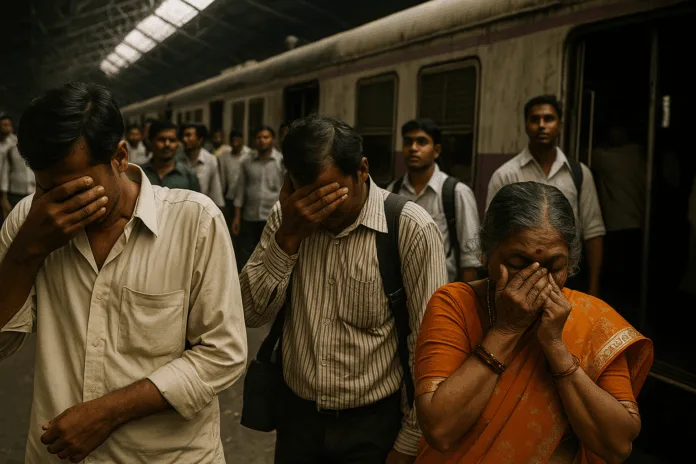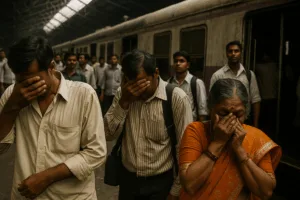
Mumbai Local Train Blasts Acquittal: Bombay High Court Frees 12 Men After 19 Years
In a major legal development that has stunned many and brought relief to some, the Mumbai Local Train Blasts Acquittal case took a dramatic turn this month. The Bombay High Court has acquitted 12 individuals who were earlier convicted for their alleged involvement in the 2006 Mumbai suburban train bombings — nearly two decades after the deadly attacks.
🔍 What Happened in 2006?
On the evening of July 11, 2006, Mumbai witnessed one of the worst terrorist attacks in its history. A series of seven powerful blasts ripped through first-class compartments of the city’s lifeline — the local trains — within a span of just 11 minutes. The death toll crossed 180, and more than 800 people were seriously injured. The city was thrown into chaos, and security agencies scrambled to find those responsible.
These attacks were later labeled a pre-planned and coordinated act of terror. Investigating agencies claimed that the explosives were packed inside pressure cookers and timed to explode during rush hour. Within months, dozens were detained, and eventually, 13 men were convicted in a special court under anti-terror laws.https://www.livelaw.in/top-stories/19-years-delay-in-justice-exposes-cracks-in-indian-legal-system-243112
⚖️ The Long Road to Justice
For years, the case was tied up in legal complexities. In 2015, a special MCOCA court had sentenced five men to death and handed life terms to seven others. The prosecution heavily relied on confessions and circumstantial evidence. At the time, it appeared that justice had been served.
But the convicted men always maintained their innocence, alleging forced confessions and fabricated evidence. Their appeals reached the Bombay High Court, where their cases sat for years — a reflection of the slow pace of the Indian judicial system.
Finally, in July 2025, nearly 19 years later, the High Court ruled that the evidence presented was not strong enough to uphold the convictions. The bench remarked that the prosecution failed to prove guilt beyond a reasonable doubt — a fundamental requirement in criminal law.https://cricket-tips3.blogspot.com/2025/08/new-zealand-vs-zimbabwe-2025-match-preview-prediction.html
🧑⚖️ A Verdict That Raises Big Questions
This Bombay High Court verdict has stirred up both relief and controversy. For the 12 men who have now walked free, it’s the end of a long-pending court case in India that took away their youth and damaged their families emotionally and financially. Many of them were in their 20s when arrested — today, they are middle-aged, having spent their prime years behind bars.
One of the acquitted men reportedly said, “We have lost everything — our families, our careers, our dignity. But at least now, the truth is out.”
But the verdict also raises disturbing questions. If these men were not the real culprits, who was? Has justice truly been delivered to the families of the victims? And why did it take 19 long years to reach this conclusion?
🏛️ The Bigger Picture: India’s Struggling Legal System
The Mumbai Local Train Blasts Acquittal has exposed the cracks in our criminal justice system. India currently has over 4 crore pending court cases, many of which are stuck in trial and appellate stages for years — sometimes decades. For every such delayed verdict, there are human lives hanging in limbo, waiting for clarity and closure.
This case also points to an urgent need for modernizing our legal system using digital tools, artificial intelligence, and smart case tracking systems. According to LiveLaw’s analysis of judicial pendency in India, the backlog affects both high-profile and everyday cases, highlighting a systemic crisis.
Faster trials, digital documentation, and evidence processing systems can minimize errors and speed up justice delivery — something the country desperately needs, especially in sensitive cases like terrorism or civil liberties.
💔 The Human Cost of Delayed Justice
No matter what legal reforms we push forward, some things can never be restored — lost years, broken families, and the trauma of wrongful imprisonment. Many of the acquitted individuals had young children who grew up without a parent. Some lost elderly family members while still in jail. Others were abandoned by their communities due to the stigma of being called a “terrorist.”
Justice delivered after two decades often feels like no justice at all — especially for the victims’ families who still seek accountability. They are left grappling with even more questions today: If these 12 were innocent, who really planted the bombs?https://mus-tech.info/iphone-17-air-leaks/
🔮 What’s Next?
This verdict is likely to have long-term implications. Legal experts believe that this may open doors for compensation claims from those wrongfully jailed. Civil society organizations are also pushing for judicial accountability and faster resolution of appeals in cases involving life and death.
Meanwhile, the government and investigative agencies will be under pressure to re-examine the original investigation and ensure the real perpetrators are brought to justice. Because when innocent lives are destroyed, and the guilty remain at large, the whole system suffers a credibility crisis.
🧾 Conclusion
The Mumbai Local Train Blasts Acquittal case is a painful reminder of the flaws in India’s legal process. It tells us that delayed justice isn’t just about dates on a file — it’s about real people, real trauma, and irreversible damage. As we move towards a digital future, there’s an urgent need to apply technology, transparency, and efficiency to the judiciary, so no more lives are stuck waiting 19 years to hear the words: “You are free to go.”https://timesofindia.indiatimes.com/india/mumbai-train-blasts-2006-case-timeline/articleshow/48919452.cms